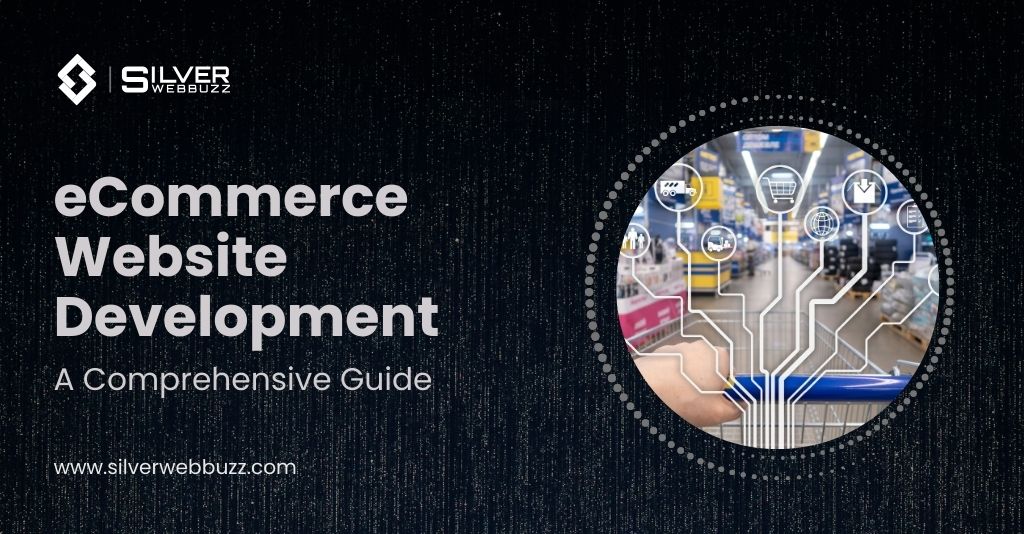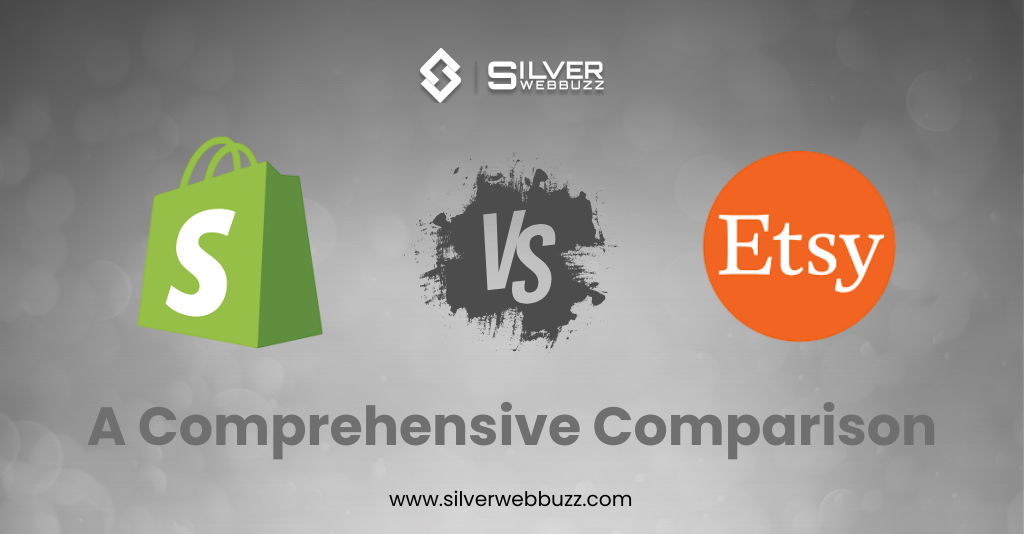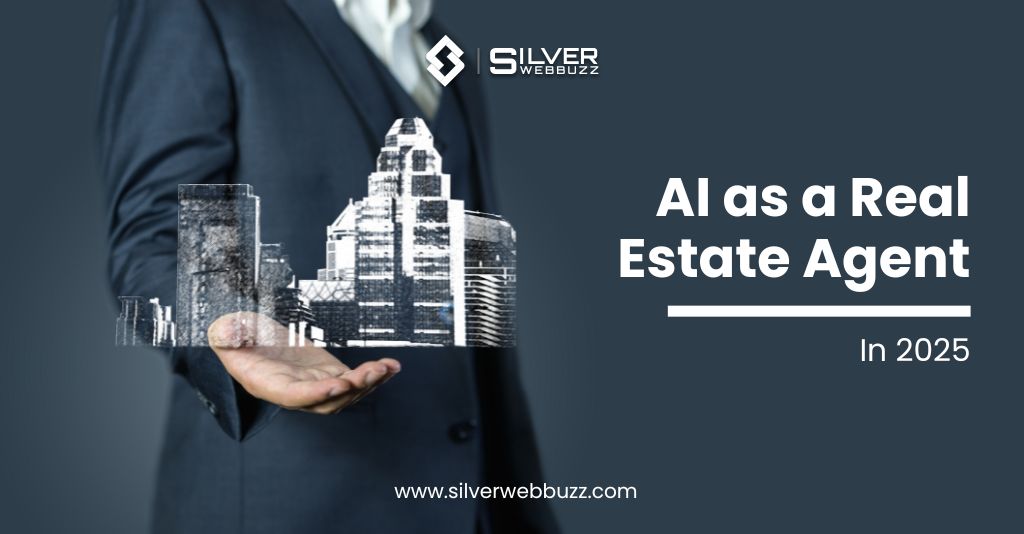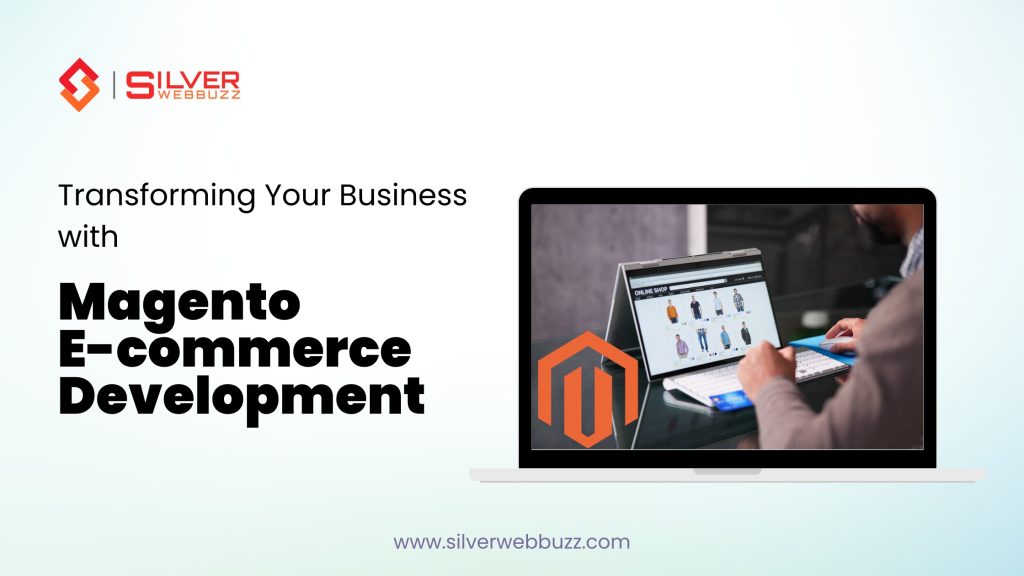In today’s digital age, eCommerce Website Development has become essential for businesses looking to expand their reach and maximize sales. With the rapid growth of online shopping, having a well-designed and functional eCommerce platform is crucial for success. A professionally developed eCommerce website ensures seamless user experience, secure transactions, and optimized performance, helping businesses attract and retain customers.
eCommerce website development services provide businesses with the tools and technologies needed to create a scalable, mobile-friendly, and secure online store. From intuitive navigation and AI-powered recommendations to real-time inventory management and multi-channel selling, professional development services enhance every aspect of the online shopping experience.
Whether you are a startup or an established brand, investing in eCommerce web development helps improve visibility, drive customer engagement, and increase revenue. This guide explores the importance of eCommerce development, key features of a successful online store, and the steps to build a high-performing eCommerce website in 2025.
What is eCommerce Website Development?
eCommerce website development refers to creating online stores where businesses can sell products or services digitally. It involves designing, developing, and optimizing websites to ensure a seamless shopping experience for customers. A well-structured e-commerce website includes features like product catalogs, secure payment gateways, user-friendly navigation, and mobile responsiveness.
Professional eCommerce Website Development is crucial in building a robust online store. These services help businesses integrate advanced functionalities such as AI-driven recommendations, real-time inventory management, and multi-channel selling. Additionally, optimizing website speed and security ensures a smooth and trustworthy shopping experience.
With the growing demand for online shopping, businesses must invest in eCommerce Website Development to stay competitive. A well-developed eCommerce platform enhances user experience and boosts sales and customer engagement. Whether you’re a startup or an established brand, having a professionally built eCommerce website can significantly improve your digital presence.
Why Is eCommerce Development Important?
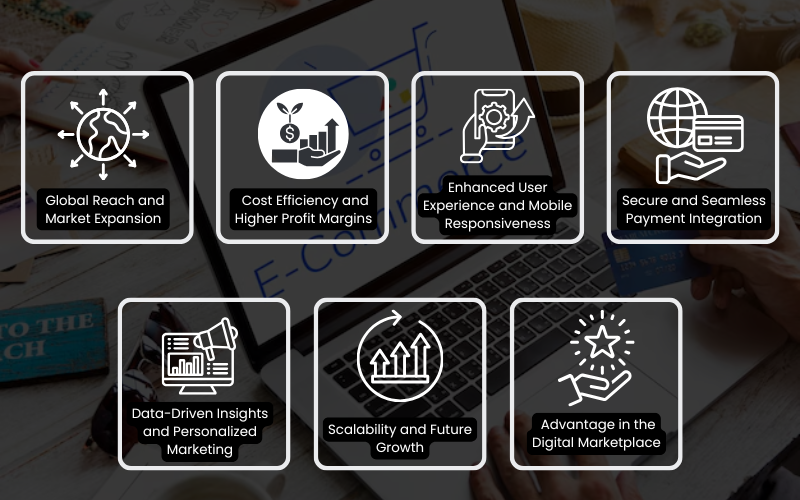
In today’s digital era, having a strong online presence is essential for businesses to thrive. Investing in eCommerce Development Services allows companies to establish a scalable and user-friendly online store, ensuring better customer engagement and increased sales. Here’s why eCommerce development is crucial:
1. Global Reach and Market Expansion
With a well-developed eCommerce website, businesses can sell their products and services to customers across the world. eCommerce Website Development help in creating an optimized platform that allows businesses to reach a broader audience, eliminating geographical limitations.
2. Cost Efficiency and Higher Profit Margins
Unlike traditional brick-and-mortar stores, an online store significantly reduces expenses such as rent, utilities, and staff salaries. By working with an expert eCommerce development company, businesses can build a cost-effective and efficient online presence, increasing profitability.
3. Enhanced User Experience and Mobile Responsiveness
A seamless user experience is key to retaining customers. Professional eCommerce Website Design Services ensure that the website is mobile-friendly, fast-loading, and easy to navigate. A well-structured and visually appealing eCommerce store keeps customers engaged and improves conversion rates.
4. Secure and Seamless Payment Integration
Security is a top priority for online transactions. eCommerce Website Development include secure payment gateways that protect customer data and ensure a smooth purchasing process. Features like multi-currency support and diverse payment options enhance trust and credibility.
5. Data-Driven Insights and Personalized Marketing
With advanced analytics and tracking tools, businesses can gather insights into customer behavior, preferences, and purchasing patterns. A professional eCommerce development company helps integrate these features, enabling businesses to optimize marketing strategies and enhance customer engagement.
6. Scalability and Future Growth
A well-structured eCommerce platform allows businesses to scale easily as they grow. eCommerce Website Development provide the flexibility to expand product offerings, integrate new technologies, and enhance overall performance without major disruptions.
7. Competitive Advantage in the Digital Marketplace
With increasing online competition, having a well-optimized website is crucial for success. Ecommerce Website Design Services ensure that businesses stay ahead by implementing SEO-friendly designs, fast-loading pages, and an intuitive user interface that attracts and retains customers.
6 Definitive Steps to Develop an eCommerce Website
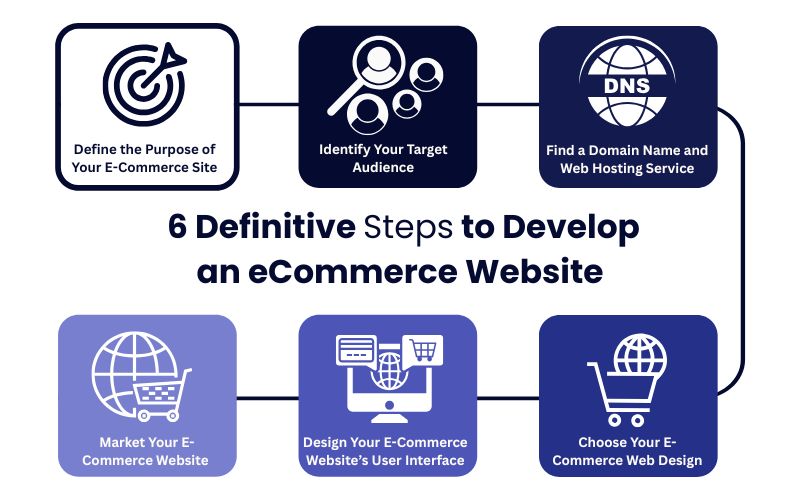
Building a successful e-commerce website requires careful planning and execution. Whether you are a startup or an established business, leveraging professional eCommerce Development Services can ensure a seamless and profitable online store. Below are the six essential steps to develop an e-commerce website:
1. Define the Purpose of Your eCommerce Site
Before diving into development, clearly define your website’s purpose. Ask yourself:
- What products or services will you offer?
- What makes your brand unique?
- What problem does your business solve?
A well-defined purpose helps in setting clear goals and aligning your website with your overall business strategy. A professional eCommerce development company can assist in structuring your platform according to your vision.
2. Identify Your Target Audience
Understanding your target audience is crucial for the success of your online store. Conduct market research to determine:
- Who are your ideal customers?
- What are their shopping habits?
- What problems do they need solutions for?
By knowing your audience, you can tailor your website’s design, content, and marketing strategies to meet their expectations. eCommerce Website Development include tools like customer analytics and behavior tracking to refine your approach.
3. Find a Domain Name and Web Hosting Service
A strong domain name and reliable hosting are the backbone of any successful e-commerce site. Follow these best practices:
- Choose a short, memorable domain name that reflects your brand.
- Ensure the hosting service offers high uptime, security, and scalability.
And selecting the right e-commerce platform is crucial for website functionality and scalability. Popular platforms include:
- Shopify – Ideal for beginners and small businesses.
- WooCommerce – Best for WordPress users looking for flexibility.
- Magento – Perfect for large-scale businesses needing advanced features
4. Choose Your eCommerce Web Design
Your website design plays a significant role in attracting and retaining customers. It should be:
- Visually appealing and aligned with your brand identity.
- Mobile-friendly and responsive on all devices.
- Easy to navigate, ensuring a smooth user experience.
Partnering with an experienced e-commerce web development company ensures that your design meets industry standards while enhancing customer engagement.
5. Design Your eCommerce Website’s User Interface
A well-structured eCommerce Website Design Services package includes:
- Clear product categories and filters for easy navigation.
- High-quality images and detailed product descriptions.
- A seamless and secure checkout process.
User-friendly navigation and intuitive design increase conversion rates and customer satisfaction. If you’re unsure where to start, platforms like BigCommerce offer customizable templates and UX-friendly features.
6. Market Your eCommerce Website
Once your site is live, marketing is crucial to driving traffic and sales. Effective strategies include:
- Search Engine Optimization (SEO): Optimize your site for keywords like eCommerce Website Development to rank higher on search engines.
- Social Media Marketing: Use platforms like Instagram, Facebook, and Pinterest to reach potential customers.
- Email Marketing: Send personalized offers and updates to engage users.
- Paid Advertising: Invest in Google Ads and social media ads for faster reach.
Features of Successful eCommerce Websites
Creating a successful e-commerce website requires more than just listing products online. With the right eCommerce Development Services, businesses can build a platform that attracts customers, enhances user experience, and increases sales. A professional e-commerce web development company ensures your website is secure, mobile-friendly, and optimized for conversions. Below are the essential features every successful e-commerce website should have.
1. User-Friendly Navigation
A well-structured website makes it easy for users to browse and find what they need. Clear categories, an intuitive search bar, and filters help customers locate products quickly. An e-commerce site should have:
- Logical menu structure with clear product categories
- Advanced search functionality with filters and auto-suggestions
- Easy-to-access shopping cart and wishlist
A well-planned navigation system reduces bounce rates and improves conversions. Learn more about effective website navigation.
2. Mobile Responsiveness
With over 70% of online shopping happening on mobile devices, ensuring mobile-friendliness is crucial. A responsive eCommerce Website Design Service provides a seamless experience across different devices.
- Mobile-friendly navigation and layout
- Optimized images and fast-loading pages
- Mobile-first payment options like Google Pay and Apple Pay
Google prioritizes mobile-friendly websites in search rankings, making this a critical factor in SEO success.
3. Secure Payment Gateways
Security is a top priority for any e-commerce site. Customers should feel confident while making transactions. A professional e-commerce web development company integrates:
- SSL encryption for secure transactions
- Multiple payment methods (Credit/Debit cards, PayPal, UPI, and Buy Now, Pay Later options)
- Fraud detection systems to prevent cyber threats
Offering secure payment gateways builds trust and encourages more conversions.
4. High-Quality Product Pages
A successful e-commerce site provides detailed and engaging product pages that help customers make informed decisions.
- Compelling product descriptions highlighting key benefits and specifications
- High-resolution images and videos showcasing the product from multiple angles
- Customer reviews and ratings to boost credibility
- Call-to-action buttons like “Add to Cart” and “Buy Now” for quick purchases
These elements help reduce hesitation and increase sales.
5. Fast Loading Speed
Website speed is a major factor in user experience and SEO. A slow website can lead to high bounce rates and lost revenue. Professional eCommerce Website Development focus on:
- Optimizing images and videos without compromising quality
- Reducing unnecessary scripts and plugins
- Using Content Delivery Networks (CDNs) to ensure fast page loading worldwide
Google recommends a load time of under 3 seconds for optimal user experience.
6. SEO-Friendly Structure
A well-optimized website ensures higher search rankings and increased organic traffic. Key SEO features include:
- Optimized URLs (e.g., yourstore.com/category/product-name)
- Meta titles and descriptions with relevant keywords
- Schema markup for rich snippets (product ratings, prices, and availability)
- Internal linking to improve website structure and navigation
Professional eCommerce Website Development ensure your website follows best SEO practices for better visibility.
7. Efficient Checkout Process
A complicated checkout process often leads to abandoned carts. A simple, one-page checkout helps improve conversions.
- Guest checkout option for quick purchases
- Auto-filled forms to save time
- Multiple payment and shipping options for convenience
- Clear return and refund policies to build trust
A seamless checkout experience enhances customer satisfaction and loyalty.
8. Strong Customer Support
Providing excellent customer support enhances user experience and builds brand trust. Features to consider:
- Live chat and chatbots for instant responses
- 24/7 customer service via email and phone
- FAQs and self-help sections for quick problem resolution
Investing in an eCommerce Website Design Service that includes strong customer support features ensures a smoother shopping experience.
9. Personalization and AI Integration
Modern e-commerce platforms use AI-driven recommendations to enhance user experience.
- Personalized product suggestions based on browsing history
- Dynamic pricing strategies for competitive deals
- AI-powered chatbots to assist customers 24/7
AI-driven personalization increases engagement and sales.
10. Social Media and Marketing Integration
A successful e-commerce website connects with social media platforms for better visibility and engagement.
- Social media sharing buttons for products and blogs
- Integration with Instagram, Facebook, and Pinterest for product promotion
- Email marketing and push notifications for retargeting customers
Marketing automation tools integrated within an e-commerce web development company solution help improve customer retention.
Common Challenges in eCommerce Website Development
(And How to Overcome Them)
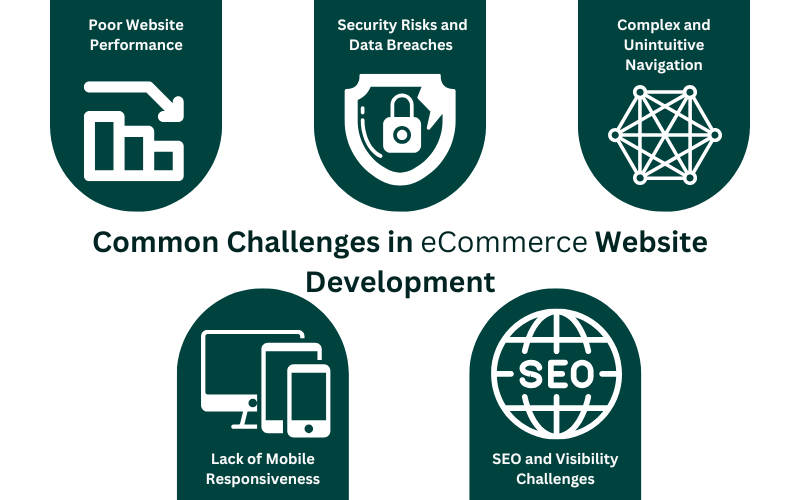
Developing a successful online store requires expertise, strategy, and advanced technology. While eCommerce Website Development provide the foundation for creating a seamless shopping experience, businesses often encounter challenges that can impact performance, security, and customer engagement. Here are the most common obstacles in eCommerce website development and how to overcome them effectively.
1. Poor Website Performance
A slow-loading website can frustrate users, leading to high bounce rates and lost sales. Page speed is a crucial factor affecting both user experience and search engine rankings.
How to Overcome It?
- Optimize images and media files to reduce load times.
- Use a Content Delivery Network (CDN) to distribute website data efficiently.
- Minimize unnecessary code and enable caching to improve website speed.
- Choose a reliable eCommerce web development company to ensure optimized performance.
2. Security Risks and Data Breaches
Online stores handle sensitive customer data, including payment information, which makes them prime targets for cyber threats. A lack of proper security measures can lead to financial losses and damage brand reputation.
How to Overcome It?
- Implement SSL certificates and HTTPS encryption for secure transactions.
- Use two-factor authentication (2FA) to enhance login security.
- Regularly update software and security patches to prevent vulnerabilities.
- Integrate secure payment gateways like PayPal, Stripe, or Razorpay.
3. Complex and Unintuitive Navigation
If customers find it difficult to browse products or complete a purchase, they are likely to abandon their shopping journey. A confusing site layout can harm conversion rates.
How to Overcome It?
- Design an intuitive menu and categorize products logically.
- Implement a predictive search function to help users find products quickly.
- Use breadcrumbs and filters to make navigation easier.
- Partner with an eCommerce Website Design Service to create a user-friendly interface.
4. Lack of Mobile Responsiveness
With the increasing number of mobile shoppers, a website that doesn’t function properly on smartphones and tablets can lead to lost sales opportunities.
How to Overcome It?
- Use responsive design techniques to ensure compatibility across all devices.
- Optimize images and buttons for mobile viewing.
- Simplify checkout processes for quick and hassle-free transactions.
- Test the website on different screen sizes before launching.
5. SEO and Visibility Challenges
No matter how well-designed an online store is, it won’t succeed without visibility in search engine results. Poor SEO strategies can lead to low organic traffic.
How to Overcome It?
- Implement keyword optimization, including eCommerce Website Development and other relevant terms.
- Use high-quality, informative content to attract and engage visitors.
- Improve technical SEO by optimizing URLs, metadata, and internal linking.
- Focus on local SEO and mobile SEO strategies to target the right audience.
eCommerce Web Development Tech Stack
Selecting the right eCommerce Development Services starts with choosing an appropriate technology stack. The tech stack defines the tools, frameworks, and platforms that power your online store. It impacts website speed, scalability, security, and overall performance.
1. What is an eCommerce Technology Stack?
An e-commerce technology stack refers to the collection of technologies used to develop and maintain an online store. It includes:
- Front-end technologies – Manage the user interface (UI) and user experience (UX).
- Back-end technologies – Handle server-side processing, business logic, and databases.
- Hosting and cloud solutions – Ensure high availability and security.
- Third-party integrations – Payment gateways, CRM, analytics, and marketing tools.
Each component plays a crucial role in ensuring an efficient and scalable e-commerce platform.
2. Why is an eCommerce Tech Stack Important?
Choosing the right technology stack affects several key aspects of an e-commerce business:
- Performance & Speed – A well-optimized stack ensures fast page load times, enhancing user experience and SEO.
- Scalability – Supports business growth, allowing for higher traffic and expanding product catalogs.
- Security – Protects sensitive customer data, ensuring secure transactions.
- Customization – Provides flexibility to integrate custom features and third-party services.
- Ease of Maintenance – Technologies with active developer communities receive regular updates and security patches.
The right tech stack ensures an efficient and future-proof e-commerce platform.
3. Factors to Consider When Choosing Your Tech Stack
When selecting a tech stack for Ecommerce Website Development Services, consider these factors:
- Cost – Open-source platforms like WooCommerce or Magento are budget-friendly, while custom-built solutions can cost anywhere from $10,000 to $100,000 depending on features and complexity.
- Complexity – Platforms like Shopify offer simplicity, while frameworks like React.js and Node.js require technical expertise.
- Compatibility – Ensure integration with payment gateways, logistics providers, and customer relationship management (CRM) tools.
- Support & Updates – Choose technologies backed by active developer communities and long-term vendor support.
Making the right choice ensures your e-commerce business remains scalable and cost-effective.
4. Technology Stack for eCommerce Development
A complete eCommerce development company uses a mix of front-end, back-end, database, and hosting technologies:
- Front-End Technologies: HTML, CSS, JavaScript (React.js, Vue.js, Angular) for an interactive UI.
- Back-End Technologies: Node.js, Python, Ruby on Rails, PHP (Laravel) for handling business logic.
- Databases: MySQL, PostgreSQL, MongoDB, Firebase for storing customer data.
- Hosting & Cloud Services: AWS, Google Cloud, DigitalOcean, Azure for scalable hosting.
Selecting the right combination enhances user experience and ensures smooth e-commerce operations.
5. Popular Tech Stacks for Tried & Tested Web Development
- LAMP Stack (Linux, Apache, MySQL, PHP): A cost-effective and widely used solution for e-commerce stores.
- MEAN Stack (MongoDB, Express.js, Angular, Node.js): Ideal for dynamic and scalable web applications.
- MERN Stack (MongoDB, Express.js, React, Node.js): Best for modern, high-performance user interfaces.
- Django + PostgreSQL: A secure and Python-based stack, great for advanced e-commerce solutions.
The choice of tech stack depends on business goals, development budget, and long-term requirements.
6. Third-Party Technology Solutions for eCommerce App Development
Many eCommerce development companies integrate third-party solutions to enhance functionality:
- Payment Gateways: Stripe, PayPal, Razorpay for secure online transactions.
- CRM & Marketing: HubSpot, Mailchimp, Salesforce for customer relationship management.
- Security & Authentication: Auth0, OAuth, Google reCAPTCHA to prevent fraud and unauthorized access.
- Analytics & Reporting: Google Analytics, Hotjar, Mixpanel for real-time data insights and business intelligence.
A well-structured tech stack ensures efficiency, security, and scalability. Investing in the right eCommerce Website Development Services helps businesses stay ahead in the competitive digital market.
eCommerce Web Development Cost
| eCommerce Pricing Factor | Small Business | Mid- Size Business | Enterprise organization |
|---|---|---|---|
| Website/Graphics | $5,000 | $15,ooo | $50,000 |
| Back-End Programming | $2,000 | $25,000 | $100,000 |
| 3rd Part Integrations | $1,000 | $10,ooo | $50,000 |
| Data Imports | $0 | $5,000 | $25,000 |
| Content Management System | $2,500 | $20,ooo | $50,000 |
| Website Hosting | $1,ooo / Year | $6,000 / Year | $12,000 / Year |
| eCommerce Website Maintenance | $3,000 / Year | $12,000 / Year | $60,000 / Year |
| SEO Services | $12,000 / Year | $50,000 / Year | $120,000 / Year |
These are the eCommerce development cost estimates for businesses of different sizes. The costs vary based on factors like website design, programming, integrations, hosting, and maintenance. An eCommerce development company can help businesses choose the right solutions, with larger businesses requiring higher investments to support advanced features and scalability.
Choosing the right eCommerce website developer
Finding the right eCommerce website Development company provider is crucial for building a high-performing online store. A skilled developer ensures seamless functionality, user-friendly navigation, and optimized performance to drive sales. When you hire expert eCommerce developers, you gain access to professionals who understand various platforms like Shopify, Magento, and WooCommerce.
Silver WebBuzz offers tailored solutions to meet business-specific needs, ensuring your store is scalable and secure. The right developer focuses on mobile responsiveness, fast loading speeds, and secure payment integrations. Additionally, they optimize SEO strategies to improve search engine visibility.
Partnering with a reputable service like Silver WebBuzz guarantees a robust eCommerce store that enhances customer experience and boosts conversions. Whether starting from scratch or upgrading an existing store, working with professionals makes a difference in achieving long-term success.
Final Word on eCommerce Website Development
Investing in eCommerce Website Development is key to building a high-performing online store. A well-designed website enhances user experience, boosts sales, and ensures secure transactions. From SEO optimization to mobile responsiveness, every detail matters in creating a seamless shopping journey.
Partnering with experts like Silver WebBuzz guarantees a scalable, secure, and user-friendly e-commerce platform. Whether starting fresh or upgrading an existing store, choosing the right development approach lays the foundation for long-term success in the competitive digital marketplace.
